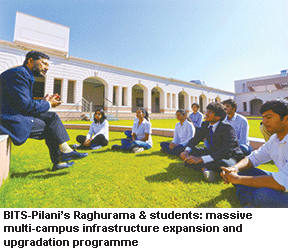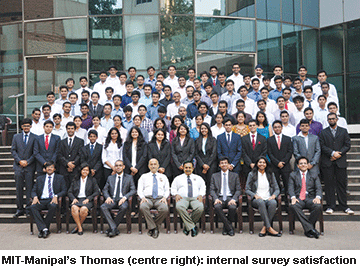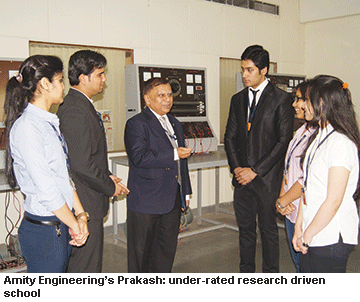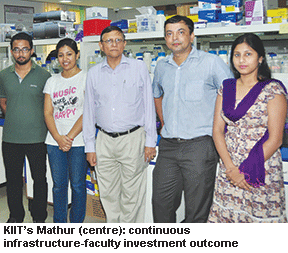 THE BIRLA INSTITUTE OF Technology and Science, Pilani (BITS-Pilani) and the International Institute of Information Technology, Hyderabad (IIIT-H) have been ranked India’s top two non-IIT engineering colleges for the second successive year in the EducationWorld India Rankings of next-best engineering colleges by a specially constituted sample database of respondents comprising 1,036 engineering faculty and 1,220 final year engineering students. The pan-India survey was conducted early this year by 150 field researchers of the well-reputed Delhi-based market research and opinion polls company Centre for Forecasting and Research Pvt. Ltd (C fore, estb. 2000).
THE BIRLA INSTITUTE OF Technology and Science, Pilani (BITS-Pilani) and the International Institute of Information Technology, Hyderabad (IIIT-H) have been ranked India’s top two non-IIT engineering colleges for the second successive year in the EducationWorld India Rankings of next-best engineering colleges by a specially constituted sample database of respondents comprising 1,036 engineering faculty and 1,220 final year engineering students. The pan-India survey was conducted early this year by 150 field researchers of the well-reputed Delhi-based market research and opinion polls company Centre for Forecasting and Research Pvt. Ltd (C fore, estb. 2000).
Although there’s been no disturbance of rankings at the very top of this year’s league table of India’s sufficiently well-known Top 100 next-best engineering colleges — College of Engineering, Anna University, Guindy (Chennai) and the National Institute of Technology, Trichy (NIT-Trichy) have retained their #3 and #4 ranks respectively — there’s a rearrangement of seating with the National Institute of Technology, Warangal (NIT-W) ranked #5 this year against #8 in 2013. Moreover while NIT-Surathkal and the Dhirubhai Ambani Institute of Information and Communication Technology, Gandhinagar (Gujarat) have retained their 2013 rankings of #6 and #7, and Delhi Technological University has risen from #9 to #8 this year, the big loser is the Indian School of Mines, Dhanbad (often referred to as the seventh IIT) which has dropped in the public esteem from #5 last year to #9 in 2014. The PSG College of Technology ranked #11 in 2013, has graduated to the Top 10 table this year.
“I am pleased to learn that your survey has accorded BITS-Pilani the apex position for the second year in succession. The high scores under the parameter of infrastructure facilities are acknowledgement that we have started a massive infrastructure expansion and upgradation programme in all three of our Indian campuses (Pilani, Goa and Hyderabad). In the Pilani campus we have embarked upon a Project Parivarthan (‘change’) initiative with an outlay of Rs.600 crore to construct new academic, faculty and students’ residential buildings. Simultaneously, we are upgrading our teaching and research labs infrastructure. Our top rating under the parameters of industry interface and placement are also justified. Our Practice School programme which makes industry internship an integral part of the curriculum from the very first year, is highly acclaimed by industry and academia leaders. Moreover, we have doubled our efforts to provide challenging career opportunities for our graduates by building a larger and stronger placement team,” says Dr. G. Raghurama, an alumnus of IIT-Madras and the Indian Institute of Science, Bangalore who started teaching in BITS-Pilani in 1987 and is currently director and senior professor of electrical and electronics engineering at this pioneering institute which was awarded deemed university status in 1964, and is celebrating its golden jubilee year.
FUETHER DOWN THE 2014 league table of non-IIT engineering colleges, the Institute of Chemical Technology, Mumbai ranked #11, PEC University of Technology, Chandigarh (13), Netaji Subhas Institute, Delhi (16), R.V. College, Bangalore (19), SSN College of Engineering, Chennai (21) and VJTI, Mumbai (25) have improved their ranking this year. More so, IIIT-Delhi (24), and the Manipal Institute of Technology (MIT-Manipal, 25) which have made great leaps forward in the esteem of informed faculty and final year students of engineering colleges. MIT-Manipal is also ranked #3 in Karnataka, overtaking PES University which was ranked higher last year. Curiously the Vellore Institute of Technology (Tamil Nadu) which is routinely ranked the country’s top private sector engineering college by India Today in its annual league table, is ranked a modest #18 by the sample respondents database constituted for this year’s EW league table.
“As a low-profile institution focused on consistently improving students’ learning outcomes and research rather than image projection, MIT-Manipal has always received a lower ranking than deserved in all media surveys. The great leap forward in our ranking this year is probably due to our graduates Satya Nadella and Rajiv Suri being promoted to top positions in Microsoft and Nokia. Nevertheless, irrespective of media rankings we are satisfied with our internal surveys which indicate that MIT is among the Top 5 private engineering colleges and among the Top 30, IITs included,” says Dr. Vinod Thomas, an alum of MIT-Manipal, and IIT-Madras, who joined the MIT-Manipal faculty immediately after graduation in 1983 and rejoined after completing his higher education at IIT-Madras. According to Thomas, who was appointed director in 2012, MIT-Manipal’s management and faculty are shaping the college’s programmes for entry into the international league tables of QS and Times Higher Education this year.
Further down the league table of the country’s Top 50 non-IIT engineering colleges, there’s little change from the 2013 rankings except that the College of Engineering, Pune (estb. 1854 and highly rated by Dr. Fakir Chand Kohli, widely acknowledged as the father of the Indian IT industry and founder of TCS) has moved up two places to be ranked #29 nationally and #4 in Maharashtra this year, and the previously unranked BITS, Pilani-Goa is ranked #39 all-India and debuts as the #1 engineering college of this tiny (pop. 1.4 million) but highly-literate state.
Likewise there are few movements this year in the rankings in the second half of India’s Top 100 non-IIT engineering colleges league table vis-a-vis 2013. Among the notable gainers are the D.J. Sanghvi College of Engineering, Mumbai which has moved up from #81 last year to #58 in 2014 (and into Maharashtra’s Top 10); the Kalinga Institute of Industrial Technology, Bhubaneswar from 90 to 71 (and #2 in Odisha); the Amity School of Engineering and Technology, Noida from #99 to 75 (and #6 in Uttar Pradesh).
Dr. P.P. Mathur an alum of Benares Hindu University who served a long stint (1988-2012) at the Central government Pondicherry University as dean of the life sciences school, and later as vice chancellor of the Jaypee Institute of Information Technology, Noida (2012-13) prior to being appointed vice chancellor of the Bhubaneswar-based KIIT University and Kalinga Institute of Industrial Technology, is pleased with the higher national ranking (#71 from #90 last year) of the institute. He is especially pleased that the informed respondents have ranked the Kalinga Institute #2 in the fast-industrialising state of Odisha (pop. 41.9 million).
 "KIIT UNIVERSITY AND THE Kalinga Institute have emerged as the research and innovation hubs of Eastern India and Odisha. During the past 17 years since the Kalinga Institute was promoted, we have continuously invested in infrastructure and excellent faculty, with the number of faculty papers cited in the refereed Scopus Index publications rising by 50 percent during the past year. As a result of continuous improvement in teaching-learning standards and research, the rush for admissions into the Kalinga Institute is getting heavier. Last year we received 125,000 applications against the 2,500 seats we offered,” says Mathur.
"KIIT UNIVERSITY AND THE Kalinga Institute have emerged as the research and innovation hubs of Eastern India and Odisha. During the past 17 years since the Kalinga Institute was promoted, we have continuously invested in infrastructure and excellent faculty, with the number of faculty papers cited in the refereed Scopus Index publications rising by 50 percent during the past year. As a result of continuous improvement in teaching-learning standards and research, the rush for admissions into the Kalinga Institute is getting heavier. Last year we received 125,000 applications against the 2,500 seats we offered,” says Mathur.
A significantly higher ranking this year — # 75 cf. # 99 in 2013 — has also somewhat cheered Dr. Ravi Prakash the highly-qualified alumnus of IIT-BHU, Salford, Cranfield and Bath universities (UK), former head of R&D at BITS-Pilani and currently director of the Amity School of Engineering & Technology, Noida. “Amity is one of India’s top research-driven universities with over 500 registered patents, excellent faculty and teacher-pupil ratios of 1:15 in undergraduate and 1:12 in postgrad classes of the engineering school, despite a student population of 5,500. Unfortunately, we are erroneously viewed as a solely profit- driven institution. On the contrary we invest all surpluses in infrastructure, well-paid faculty and research. This is reflected — although inadequately — in the high ratings we have been given under the parameters of research and infrastructure. In my opinion the Amity School of Engineering deserves to be ranked among the Top 10 in your league table,” says Prakash.
In the bottom quarter of the league table also, most colleges have retained or marginally improved their rankings. However this year, several regionally reputed engineering colleges including the Walchand College of Engineering, Sangli (ranked 16 in Maharashtra) at #96; the Vidyalankar Institute of Technology, Mumbai (#17 in Maharashtra and #97 nationally); Universal College of Engineering, Vasai, Mumbai (#18 and #98) and the Rajiv Gandhi Institute of Technology, Mumbai (#19 and #100), have debuted in the national league table. The national and state league tables of India’s Top 100 non-IIT engineering colleges are set out in the pages following.